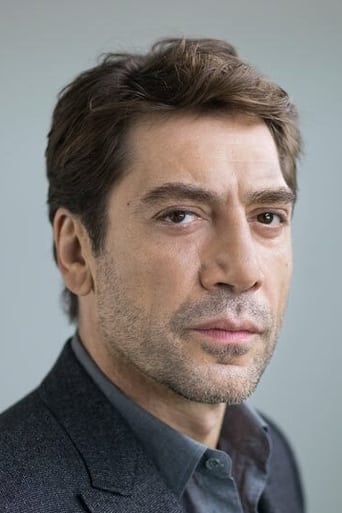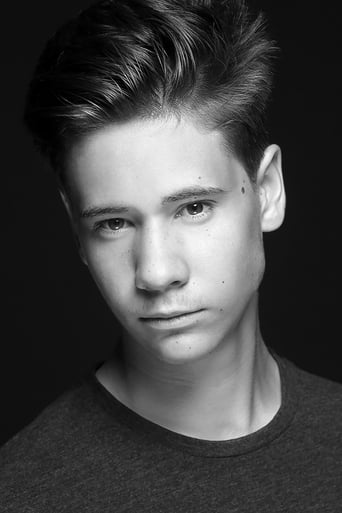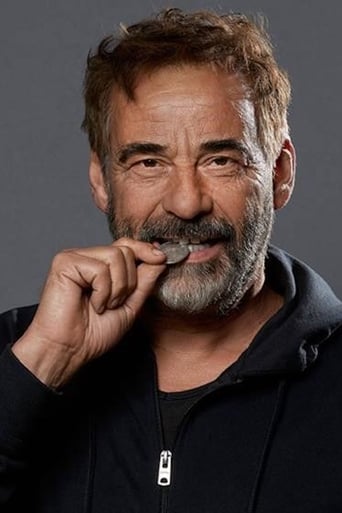Exoticalot
People are voting emotionally.
StyleSk8r
At first rather annoying in its heavy emphasis on reenactments, this movie ultimately proves fascinating, simply because the complicated, highly dramatic tale it tells still almost defies belief.
Isbel
A terrific literary drama and character piece that shows how the process of creating art can be seen differently by those doing it and those looking at it from the outside.
larry_b
Wonderful and sad. Beautifully acted and shot. ... Watch it.
Jorge Lopez-Perez
The movie Biutiful follows the darkest time in the life of a man named Uxbal. Uxbal lives his life in both the after-life and present life. The movie takes place in Barcelona in the present day. He lives with his children, Ana and Mateo. Him and his wife, Maramba are divorced due to drug abuse on her part. This causes a lot of tension within the family. Uxbal works by helping illegal immigrants sell fake goods on the streets of Spain. The African immigrants sell the products while the Chinese make it and he keeps it all in line with the Guardia civil (police). As the movie develops Uxbal learns of his developing cancer and the little time he has to live. The movie follows Uxbals fear of death as his cancer becomes progressively worse and it becomes darker and more grotesque as he comes closer and closer to his death that he pushes away. The movie does a very good job of addressing the social and political problems in Spain. One of the most important that is addressed in the movie is the hidden poverty of Spain. The movie takes place in Barcelona but it is filmed in a way to make the poverty very clear. Another large problem that is addressed by the movie is Spain's illegal immigrant poverty/population. The movie is filmed in a way to make these themes stand out a lot. Although filmed in Barcelona, a beautiful city, the city looks grotesque and dirty. The movie itself is very dark and gritty. However in the few scenes where there is a good moment or when Uxbal is finally in the afterlife the movie becomes almost too bright or very brightly colored, sometimes artificially or naturally. The music also take a huge part in making the social and political themes stand out. The music is very subtle throughout the movie but there are moment when the music is very prominent. Like for example during the massive arrest of immigrants, or in the club scene where it seems as if Uxbal has full given up and the music over powers his thoughts. Most of the time it really isn't music but just individual notes or long held sounds that give the movie a tense feeling or a feeling of worry. For example whenever there is the appearance of a ghost the movie becomes very quiet with only an individual sound playing in the back ground. The sound is very well placed in the movie and compliments the visuals very well to make the true themes and acting stand out. If I were to say one thing about this movie that I did not enjoy it would be the length. The film isn't truly very long but it has so much information that it goes by very slow, but even then tat isn't a complaint because all the information given just made me want to watch it again. This movie is not a movie that can be watched just once to fully understand it. It has to be watched at least twice. This movie is visually beautiful and it has themes to make one rethink how we treat the life of others. It is a movie to make you think about how dark and grotesque the world truly is. It is a movie to make you feel like you need to express more love to those around you. It is not for the lighthearted but it is a fantastic film that I will recommend to everyone. A must see. 10/10
hoxjennifer
Unlike 21 Grams and Amores Perros, Inarritu deviates from the 4 lives - 1 story line - and completes his "Death Trilogy" with the story of one man, Uxbal, who touches many lives in some way shape or form, and appropriately is able to sense the dead and help them pass on safely to the after world. Uxbal is not perfect. Although you can tell he has a heart of gold, he makes a living helping illegal immigrants find work, always with his cut of the pay. Although for the most part, people trust him and turn to him for help, sometimes his good intention land him in trouble. Biutiful is all about paradoxes. The title is the Spanish phonetic spelling of "Beautiful" yet most of the film is set in the lower income, gritty neighbourhoods of Barcelona. Uxbal uses his ability to ease the dead of their debts in life and sort out their affairs, yet he struggles with settling his own affairs. Even his relationships with other people are paradoxes - he is obviously not completely okay with her promiscuity, yet he understands - he is harsh and strict with his son Mateo but does not stand for his wife's physical abuse of him - but his most important relationship is one with himself. He reconciles this by learning to let go, learning to let the universe take care of everything, as Bea, his healer confidante, had told him.Biutiful is a beautiful film, but it is not perfect. There are some plot holes that are left unanswered (for example, whether the Chinese immigrants receive justice for their death, whether Uxbal's grief is ever really atoned). I think these unanswered questions are left open to interpretation though, as that seems to be Inarritu's style in these type of films. A great watch, although dark and at times deeply depressing, there is a small glimmer of hope at the end of the film - and I think that's what important to take away from this. Despite everything, life is biutiful.
Turfseer
Alejandro González Iñárritu's 'Biutiful' received a slew of mixed reviews upon its release in 2010. The naysayers found the grim tale of a doomed underworld 'fixer' Uxbal (played with a quiet intensity by Javier Barden) to be either too long, heavy-handed or grim for their tastes. In my view, while 'Biutiful' may not rise to the level of true tragedy, there are many worthwhile elements in it that may lead one to conclude that this is a rather well-put together melodrama.The world that Iñárritu has created rings true. For starters, his protagonist, Uxbal, moves about in a hard-edged section of Barcelona, peopled with immigrants, many engaged in illegal activities to support themselves. Indeed, Uxbal is a middleman for a group of Chinese immigrants who manufacture knockoff handbags. Uxbal also oversees another group of immigrants from Senegal, who are entrusted with selling the knockoffs; but when they turn to selling drugs, and the police move in to bust them, he must find another line of work for the Chinese.It just so happens that Uxbal and his low-life brother, Tito, are able to make a deal with a construction contractor, after they agree to allow developers to raise a cemetery where their father is buried. The foreman at the construction site agrees to hire the Chinese, even though they have no experience in construction. The beleaguered group are housed in a cold, dank warehouse, where they are soon to meet a most tragic fate.Two turns in the plot keep the action moving forward. Uxbal is first diagnosed with cancer and he must get his affairs in order so that arrangements are made so that someone will end up taking care of his two young children after he's gone. Uxbal cannot count on his estranged wife, Marambra, who suffers from bipolar disorder and their reconciliation fails, when she leaves their young son home alone (to punish him) after going on a short vacation. Marambra is a great character, played very convincingly by Maricel Álvarez. In a sense, she is the true antagonist in the narrative and thwarts Uxbal in making a stable home for the children.Another great character is Uxbal's brother, Tito, who represents Uxbal's dark side. Not only does he tempt Uxbal into using drugs at a moment that he is most vulnerable, but Uxbal ultimately discovers that Tito has also been fooling around with Marambra. The pulsating, dark scene in the nightclub highlights the brother's descent into depravity.The second turn in the plot occurs when Uxbal, thinking of the brutal conditions the Chinese workers are toiling under, decides to buy a bunch of cheap heaters so they can be somewhat warm at the warehouse (he buys only cheap heaters because his financial condition is in dire straits). Tragically, the heaters malfunction and all the workers die of carbon monoxide poisoning.Consumed with grief, Uxbal consults with a friend, a holistic healer, who tells him not to blame himself, since the event was an "accident." Later, he gives money to Ige, wife of one of Uxbal's Senegalese workers who is about to be deported, to take care of his children. Ige is about to leave with the money, but changes her mind, and ends up deciding to stay in Barcelona, and help take care of the children.Uxbal's decline is sad, particularly because underneath he's not such a bad guy after all (we can see that in his concern for his kids). Also quite tragic is Uxbal's longing for a father he never knew; we see him in flashbacks at the beginning and end of the film. The father also died tragically after fleeing to Mexico, as a fugitive from the Franco regime, before Uxbal was born.Iñárritu's focus on Uxbal as a tragic figure, may have gone on for a little too long. What's much more interesting is the world he inhabits, which Iñárritu conveys in an unflinching and efficacious manner.






